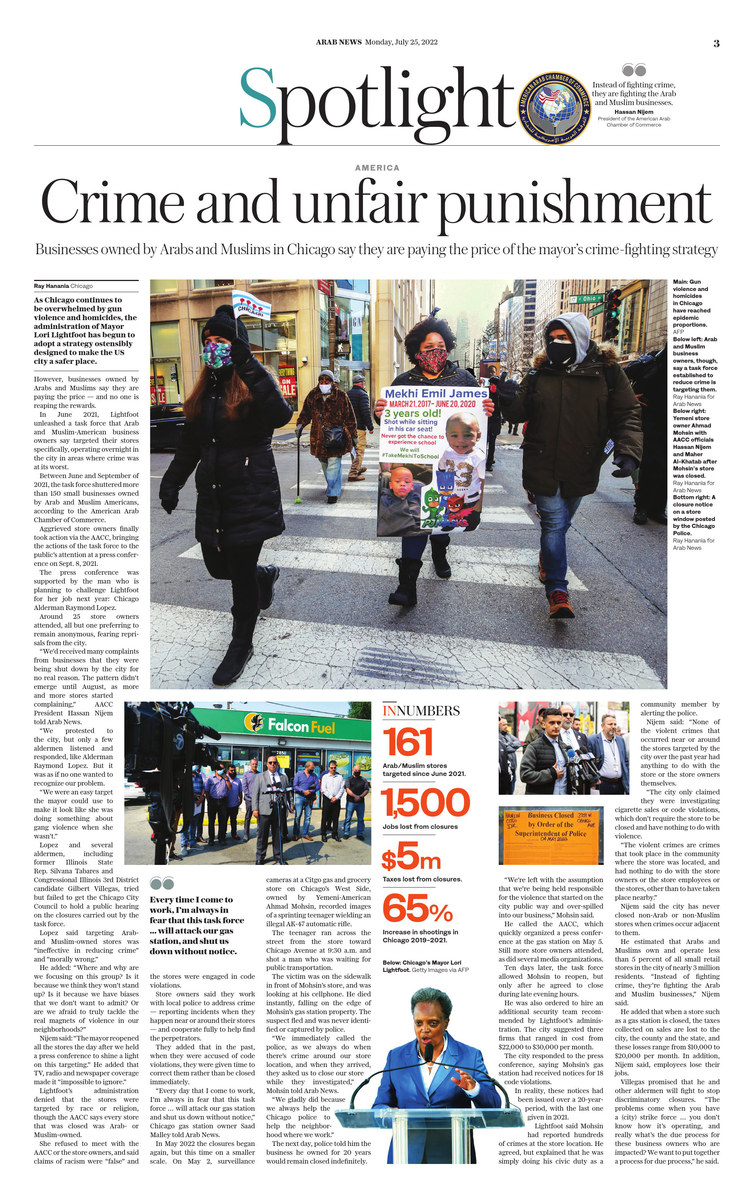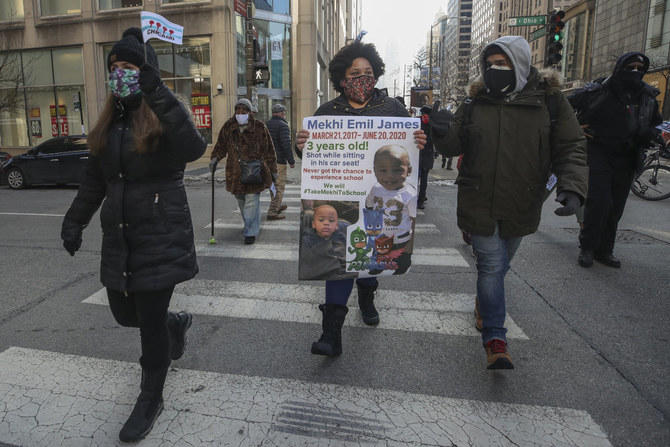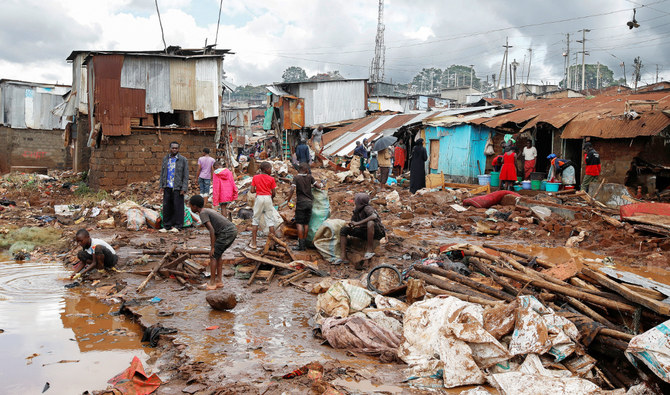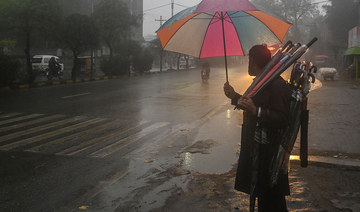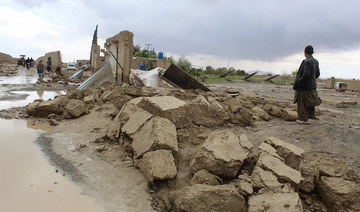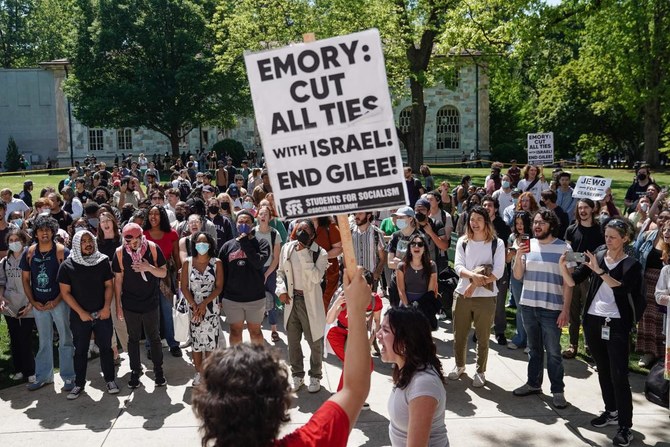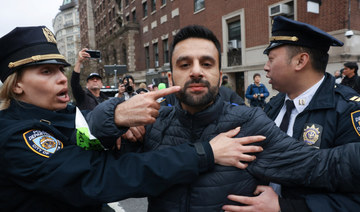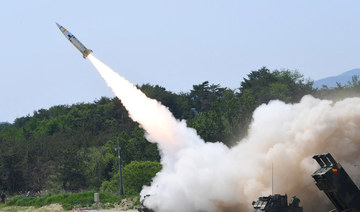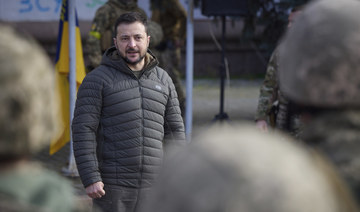CHICAGO: As Chicago continues to be overwhelmed by gun violence and homicides, the administration of Mayor Lori Lightfoot has begun to adopt a strategy ostensibly designed to make the US city a safer place.
However, Muslim- and Arab-owned businesses say they are paying the price — and no one is reaping the rewards.
In June 2021, Lightfoot unleashed a task force that Arab- and Muslim-American business owners say targeted their stores specifically, operating overnight in the city in areas where crime was at its worst.
Between June and September of 2021, the task force shuttered more than 150 small businesses owned by Arab and Muslim Americans, according to the American Arab Chamber of Commerce.
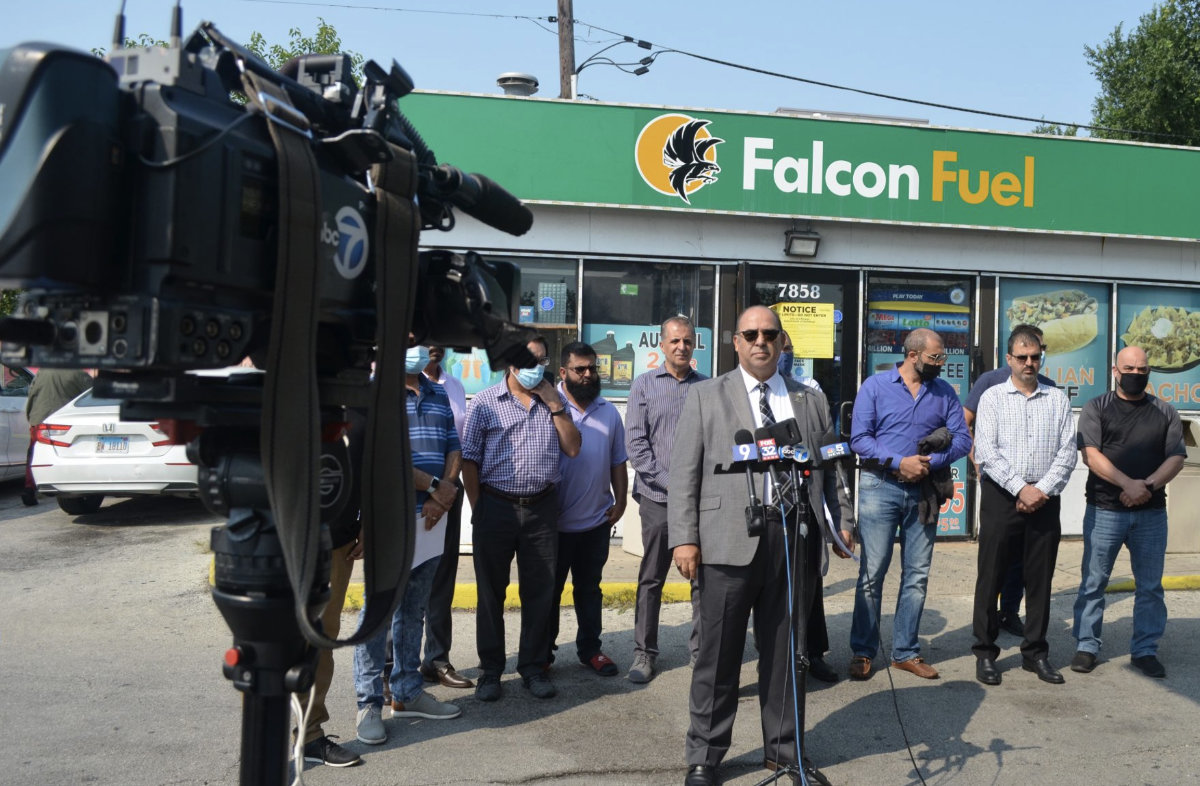
Arab and Muslim business owners hold a press conference to complaint that the task force established to reduce crime is targeting them. (Ray Hanania for Arab News)
Aggrieved store owners finally took action via the AACC, bringing the actions of the task force to the public’s attention at a press conference on Sept. 8, 2021.
The press conference was supported by the man who is planning to challenge Lightfoot for her job next year: Chicago Alderman Raymond Lopez.
Around 25 store owners attended, all but one preferring to remain anonymous, fearing reprisals from the city.
“We’d received many complaints from businesses that they were being shut down by the city for no real reason. The pattern didn’t emerge until August, as more and more stores started complaining,” AACC President Hassan Nijem told Arab News.
“We protested to the city, but only a few aldermen listened and responded, like Alderman Raymond Lopez. But it was as if no one wanted to recognize our problem.
“We were an easy target the mayor could use to make it look like she was doing something about gang violence when she wasn’t.”
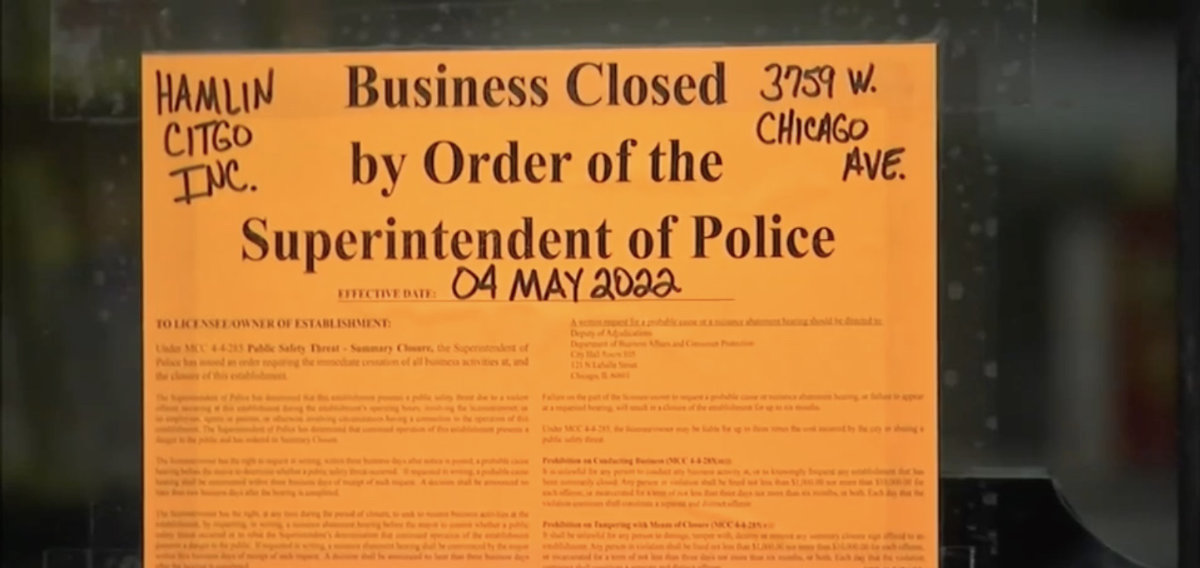
A closure notice on a store window posted by the Chicago Police. (Ray Hanania for Arab News)
Lopez and several aldermen, including former Illinois State Rep. Silvana Tabares and Congressional Illinois 3rd District candidate Gilbert Villegas, tried but failed to get the Chicago City Council to hold a public hearing on the closures carried out by the task force.
Lopez said targeting Arab- and Muslim-owned stores was “ineffective in reducing crime” and “morally wrong.”
He added: “Where and why are we focusing on this group? Is it because we think they won’t stand up? Is it because we have biases that we don’t want to admit? Or are we afraid to truly tackle the real magnets of violence in our neighborhoods?”
Nijem said: “The mayor reopened all the stores the day after we held a press conference to shine a light on this targeting.” He added that TV, radio and newspaper coverage made it “impossible to ignore.”

Chicago Mayor Lori Lightfoot denies targetting Arabs and Muslims. (. Getty Images via AFP)
Lightfoot’s administration denied that the stores were targeted by race or religion, though the AACC says every store that was closed was Arab- or Muslim-owned.
She refused to meet with the AACC or the store owners, and said claims of racism were “false” and the stores were engaged in code violations.
Store owners said they work with local police to address crime — reporting incidents when they happen near or around their stores — and cooperate fully to help find the perpetrators.
They added that in the past, when they were accused of code violations, they were given time to correct them rather than be closed immediately.
“Every day that I come to work, I’m always in fear that this task force … will attack our gas station and shut us down without notice,” Chicago gas station owner Saad Malley told Arab News.
INNUMBERS
161 - Arab/Muslim stores targeted since June 2021.
1,500 - Jobs lost from closures.
$5m - Taxes lost from closures.
65% - Increase in shootings in Chicago 2019-2021.
In May 2022 the closures began again, but this time on a smaller scale. On May 2, surveillance cameras at a Citgo gas and grocery store on Chicago’s West Side, owned by Yemeni-American Ahmad Mohsin, recorded images of a sprinting teenager wielding an illegal AK-47 automatic rifle.
The teenager ran across the street from the store toward Chicago Avenue at 9:30 a.m. and shot a man who was waiting for public transportation.
The victim was on the sidewalk in front of Mohsin’s store, and was looking at his cellphone. He died instantly, falling on the edge of Mohsin’s gas station property. The suspect fled and was never identified or captured by police.
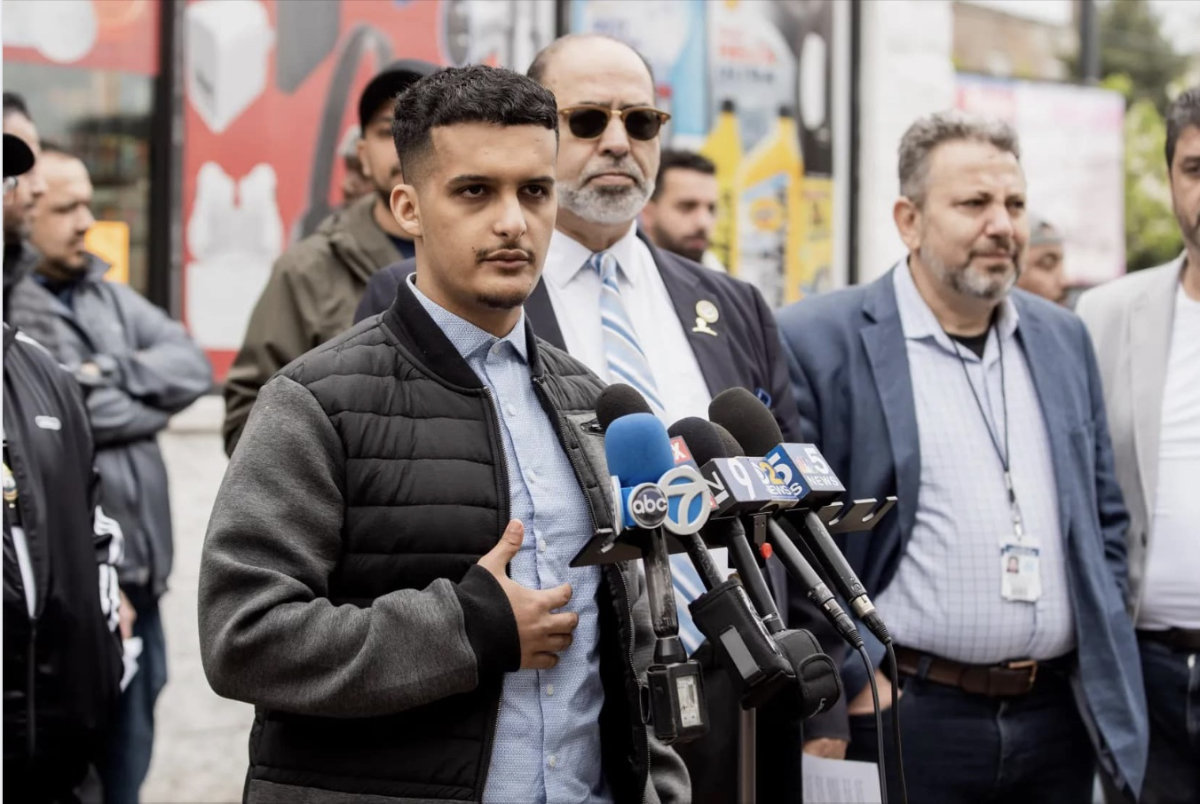
Yemeni store owner Ahmad Mohsin with AACC officials Hassan Nijem and Maher Al-Khatab after Mohsin’s store was closed. (Ray Hanania for Arab News)
“We immediately called the police, as we always do when there’s crime around our store location, and when they arrived, they asked us to close our store while they investigated,” Mohsin told Arab News.
“We gladly did because we always help the Chicago police to help the neighborhood where we work.”
The next day, police told him the business he owned for 20 years would remain closed indefinitely.
“We’re left with the assumption that we’re being held responsible for the violence that started on the city public way and over-spilled into our business,” Mohsin said.
He called the AACC, which quickly organized a press conference at the gas station on May 5. Still more store owners attended, as did several media organizations.

People hold signs during an anti-gun violence march in Chicago on Dec. 31, 2020, as the number of murders in the city rose to 768, up a whopping 252 from the 2019 total of the 516. (AFP)
Ten days later, the task force allowed Mohsin to reopen, but only after he agreed to close during late evening hours.
He was also ordered to hire an additional security team recommended by Lightfoot’s administration. The city suggested three firms that ranged in cost from $22,000 to $30,000 per month.
The city responded to the press conference, saying Mohsin’s gas station had received notices for 18 code violations.
In reality, these notices had been issued over a 20-year-period, with the last one given in 2021.
Lightfoot said Mohsin had reported hundreds of crimes at the store location. He agreed, but explained that he was simply doing his civic duty as a community member by alerting the police.
Nijem said: “None of the violent crimes that occurred near or around the stores targeted by the city over the past year had anything to do with the store or the store owners themselves.
“The city only claimed they were investigating cigarette sales or code violations, which don’t require the store to be closed and have nothing to do with violence.
“The violent crimes are crimes that took place in the community where the store was located, and had nothing to do with the store owners or the store employees or the stores, other than to have taken place nearby.”
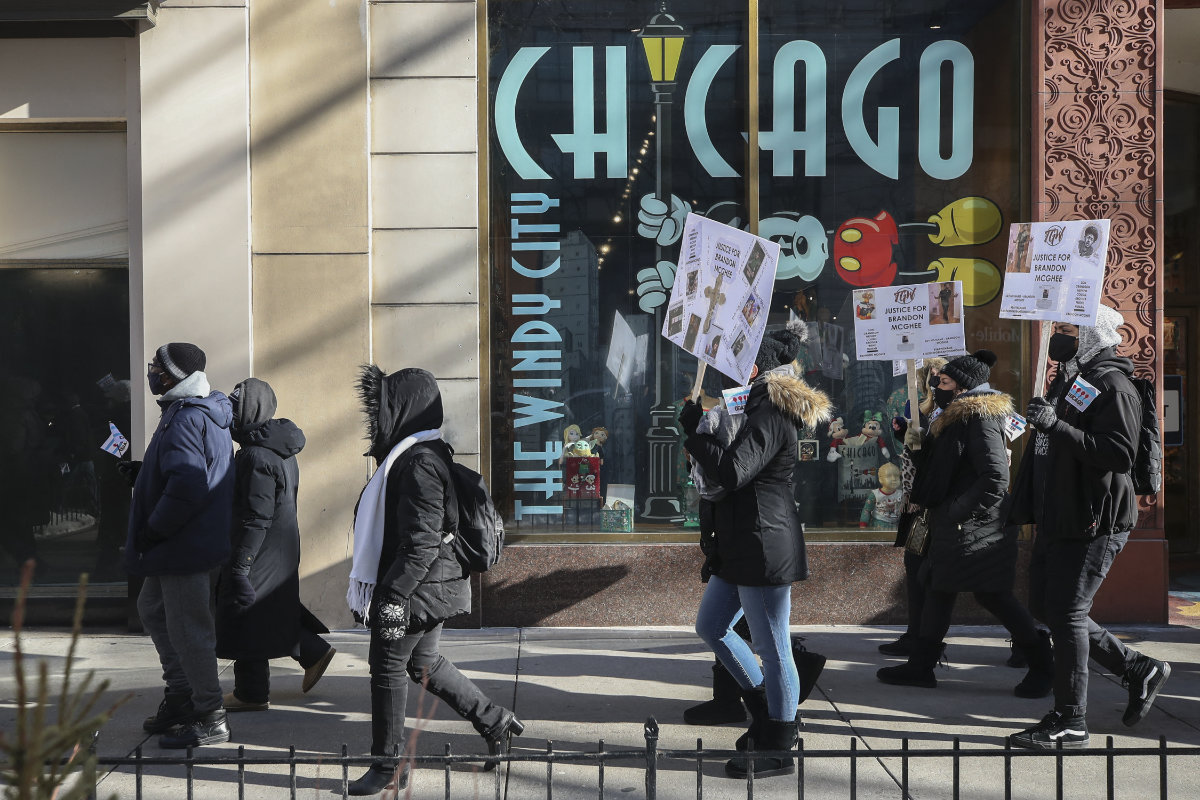
People hold signs during an anti-gun violence march in Chicago on Dec. 31, 2020, as the number of murders in the city rose to 768, up a whopping 252 from the 2019 total of the 516. (AFP)
Nijem said the city has never closed non-Arab or non-Muslim stores when crimes occur adjacent to them.
He estimated that Arabs and Muslims own and operate less than 5 percent of all small retail stores in the city of nearly 3 million residents. “Instead of fighting crime, they’re fighting the Arab and Muslim businesses,” Nijem said.
He added that when a store such as a gas station is closed, the taxes collected on sales are lost to the city, the county and the state, and these losses range from $10,000 to $20,000 per month. In addition, Nijem said, employees lose their jobs.
Villegas promised that he and other aldermen will fight to stop discriminatory closures. “The problems come when you have a (city) strike force … you don’t know how it’s operating, and really what’s the due process for these business owners who are impacted? We want to put together a process for due process,” he said.
